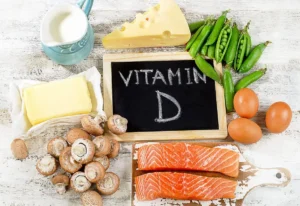
Table of Contents
Keeping the body healthy is the responsibility of the immune system, working tirelessly to fight pathogens and maintain the body’s health. Optimal immune function requires a steady supply of essential nutrients. This process relies on micronutrients, including vitamins and minerals, which each support immune responses in a different way.
While the body requires these nutrients in small quantities, their impact on health is substantial, influencing everything from cell production to antioxidant defenses. While consuming a balanced diet rich in micronutrients can boost immunity, modern lifestyles and diets often lack the necessary amounts. This gap has led to the rise of innovative solutions like Micronutrients Vitamin Boost Shots, which offer targeted nutrient delivery to bolster immune function.
Key Micronutrients for Immune Support
The immune system relies on several micronutrients to function effectively, each contributing uniquely to immune defense mechanisms.
Vitamin C
Vitamin C, ascorbic acid, is widely recognized for its immune-enhancing properties. It facilitates the production and function of white blood cells, particularly phagocytes and lymphocytes, which help protect the body against infections. Vitamin C also aids in producing antibodies, proteins that bind to and neutralize pathogens.
Aside from its role in immune cell function, vitamin C is a robust antioxidant that shields cells against free radical damage. This antioxidant activity is crucial for maintaining the integrity of tissues and organs, particularly during an immune response.
Vitamin C is readily accessible in citrus fruits such as oranges, lemons, and grapefruits, as well as strawberries, peppers, and broccoli. Diets high in these foods support adequate vitamin C levels, benefiting the body’s immune defenses.
Vitamin D
Immune cells, including T cells and macrophages, are activated and proliferated by TNF, allowing them to identify and eliminate pathogens. Aside from this, vitamin D directly combats bacteria and viruses by regulating the production of antimicrobial proteins.
While sunlight exposure enables the body to produce vitamin D, dietary sources are also important, especially during months with limited sun exposure. Salmon, mackerel, eggs yolks, and fortified dairy products are all foods high in vitamin D.
Vitamin E
Vitamin E prevents oxidative stress on immune cells by acting as a powerful antioxidant. This protection is crucial for maintaining the efficacy of immune responses, as oxidative damage can impair cell function and weaken the immune system.
Sources of vitamin E include nuts, seeds, spinach, and vegetable oils. Dietary intake of these foods can support the body’s antioxidant defenses and immune function.
Zinc
Zinc is a trace element required for the development and function of immune cells. It supports the production of cytokines, proteins that facilitate communication between immune cells, enhancing the body’s ability to respond effectively to infections.
Zinc deficiency can compromise immune function, potentially contributing to increased susceptibility to infections. Good sources of zinc exist in meat, shellfish, legumes, and nuts. Zinc supplements or diet can help maintain a strong immune system by ensuring adequate intake.
Selenium
Selenium contributes to immune defense by supporting the activity of antioxidants and enhancing the production of immune cells. This mineral is particularly effective in combating oxidative stress and reducing inflammation, both of which can compromise immune function.
Selenium-rich foods include Brazil nuts, seafood, eggs, and poultry. Incorporating these foods into the diet can aid in sustaining immune health and lessen the risk of infections.
Iron
Iron is involved in various immune processes, including the proliferation and differentiation of immune cells. It also supports the production of enzymes necessary for immune cell function.
Iron deficiency can lead to impaired immune responses and increased susceptibility to infections. Sources of iron include red meat, poultry, beans, and fortified cereals. Ensuring adequate iron intake through diet can help maintain immune competence.
B Vitamins (B6, B9, B12)
Energy metabolism and immune cell production are dependent on B vitamins. Vitamin B6 supports the biochemical reactions involved in immune function, while folate (B9) and vitamin B12 are essential for the production and maturation of immune cells.
Dietary sources of B vitamins include meat, fish, poultry, eggs, dairy products, and leafy greens. Incorporating these foods into the diet can help support the immune system’s cellular processes.
Micronutrients Vitamin Boost Shots
Vitamin Boost Shots are an innovative approach to nutrient supplementation, offering a more efficient method than traditional oral supplements. These shots involve the intravenous administration of essential vitamins and minerals, providing several advantages over oral intake.
Advantages Over Oral Supplements
- Direct Absorption: Oral supplements must pass through the digestive system, where absorption can be inconsistent and inefficient due to digestive health, metabolic rate, and dietary habits. Vitamin Boost Shots bypass the digestive system entirely, delivering nutrients directly into the bloodstream. This direct absorption ensures the body receives the full benefit of the administered vitamins and minerals, leading to more immediate and noticeable effects.
- Increased Bioavailability: The bioavailability of nutrients is significantly higher with intravenous delivery. When nutrients are introduced directly into the bloodstream, they are readily available for use by the body’s cells, enhancing their effectiveness in supporting immune function and overall health. In contrast, the bioavailability of oral supplements can be reduced by factors such as food interactions and digestive enzymes.
- Immediate Effects: Because Vitamin Boost Shots deliver nutrients directly to the bloodstream, clients often experience benefits within hours to days. This rapid delivery system can be particularly beneficial for individuals needing quick recovery from illness or seeking immediate energy and immune support.
- Customization: Vitamin Boost Shots can be tailored to individual needs, addressing specific health concerns such as fatigue, immune support, skin health, and more. This customization ensures that individuals receive the exact nutrients they need, in the right amounts, to support their unique health goals.
- Avoidance of Digestive Issues: Some individuals experience gastrointestinal discomfort or difficulty absorbing nutrients when taking oral supplements. Vitamin Boost Shots eliminate these concerns by bypassing the digestive tract, making them suitable for those with digestive issues or malabsorption disorders.
Takeaway
Vitamin Boost Shots provide a more efficient and immediate solution, offering direct nutrient delivery to enhance immune function and address specific health needs.
At 360Envy Aesthetics & Wellness, the team understands the importance of a well-functioning immune system and proper nutrition’s role in achieving optimal health. Our tailored Vitamin Boost Shots are designed to provide the vitamins and minerals your body needs, ensuring you experience the full benefits of enhanced energy, improved immune support, and overall vitality. Contact us for your personal assessment!







